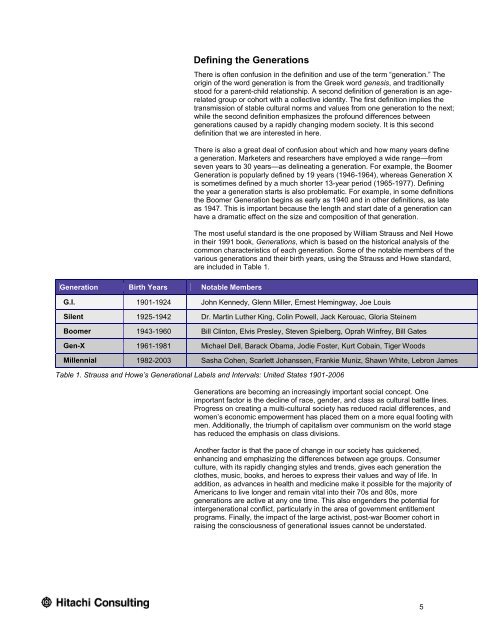Workforce Transformation: - Hitachi Consulting
Workforce Transformation: - Hitachi Consulting
Workforce Transformation: - Hitachi Consulting
You also want an ePaper? Increase the reach of your titles
YUMPU automatically turns print PDFs into web optimized ePapers that Google loves.
Defining the Generations<br />
Generation Birth Years Notable Members<br />
There is often confusion in the definition and use of the term “generation.” The<br />
origin of the word generation is from the Greek word genesis, and traditionally<br />
stood for a parent-child relationship. A second definition of generation is an agerelated<br />
group or cohort with a collective identity. The first definition implies the<br />
transmission of stable cultural norms and values from one generation to the next;<br />
while the second definition emphasizes the profound differences between<br />
generations caused by a rapidly changing modern society. It is this second<br />
definition that we are interested in here.<br />
There is also a great deal of confusion about which and how many years define<br />
a generation. Marketers and researchers have employed a wide range—from<br />
seven years to 30 years—as delineating a generation. For example, the Boomer<br />
Generation is popularly defined by 19 years (1946-1964), whereas Generation X<br />
is sometimes defined by a much shorter 13-year period (1965-1977). Defining<br />
the year a generation starts is also problematic. For example, in some definitions<br />
the Boomer Generation begins as early as 1940 and in other definitions, as late<br />
as 1947. This is important because the length and start date of a generation can<br />
have a dramatic effect on the size and composition of that generation.<br />
The most useful standard is the one proposed by William Strauss and Neil Howe<br />
in their 1991 book, Generations, which is based on the historical analysis of the<br />
common characteristics of each generation. Some of the notable members of the<br />
various generations and their birth years, using the Strauss and Howe standard,<br />
are included in Table 1.<br />
G.I. 1901-1924 John Kennedy, Glenn Miller, Ernest Hemingway, Joe Louis<br />
Silent 1925-1942 Dr. Martin Luther King, Colin Powell, Jack Kerouac, Gloria Steinem<br />
Boomer 1943-1960 Bill Clinton, Elvis Presley, Steven Spielberg, Oprah Winfrey, Bill Gates<br />
Gen-X 1961-1981 Michael Dell, Barack Obama, Jodie Foster, Kurt Cobain, Tiger Woods<br />
Millennial 1982-2003 Sasha Cohen, Scarlett Johanssen, Frankie Muniz, Shawn White, Lebron James<br />
Table 1. Strauss and Howe’s Generational Labels and Intervals: United States 1901-2006<br />
Generations are becoming an increasingly important social concept. One<br />
important factor is the decline of race, gender, and class as cultural battle lines.<br />
Progress on creating a multi-cultural society has reduced racial differences, and<br />
women’s economic empowerment has placed them on a more equal footing with<br />
men. Additionally, the triumph of capitalism over communism on the world stage<br />
has reduced the emphasis on class divisions.<br />
Another factor is that the pace of change in our society has quickened,<br />
enhancing and emphasizing the differences between age groups. Consumer<br />
culture, with its rapidly changing styles and trends, gives each generation the<br />
clothes, music, books, and heroes to express their values and way of life. In<br />
addition, as advances in health and medicine make it possible for the majority of<br />
Americans to live longer and remain vital into their 70s and 80s, more<br />
generations are active at any one time. This also engenders the potential for<br />
intergenerational conflict, particularly in the area of government entitlement<br />
programs. Finally, the impact of the large activist, post-war Boomer cohort in<br />
raising the consciousness of generational issues cannot be understated.<br />
5

















